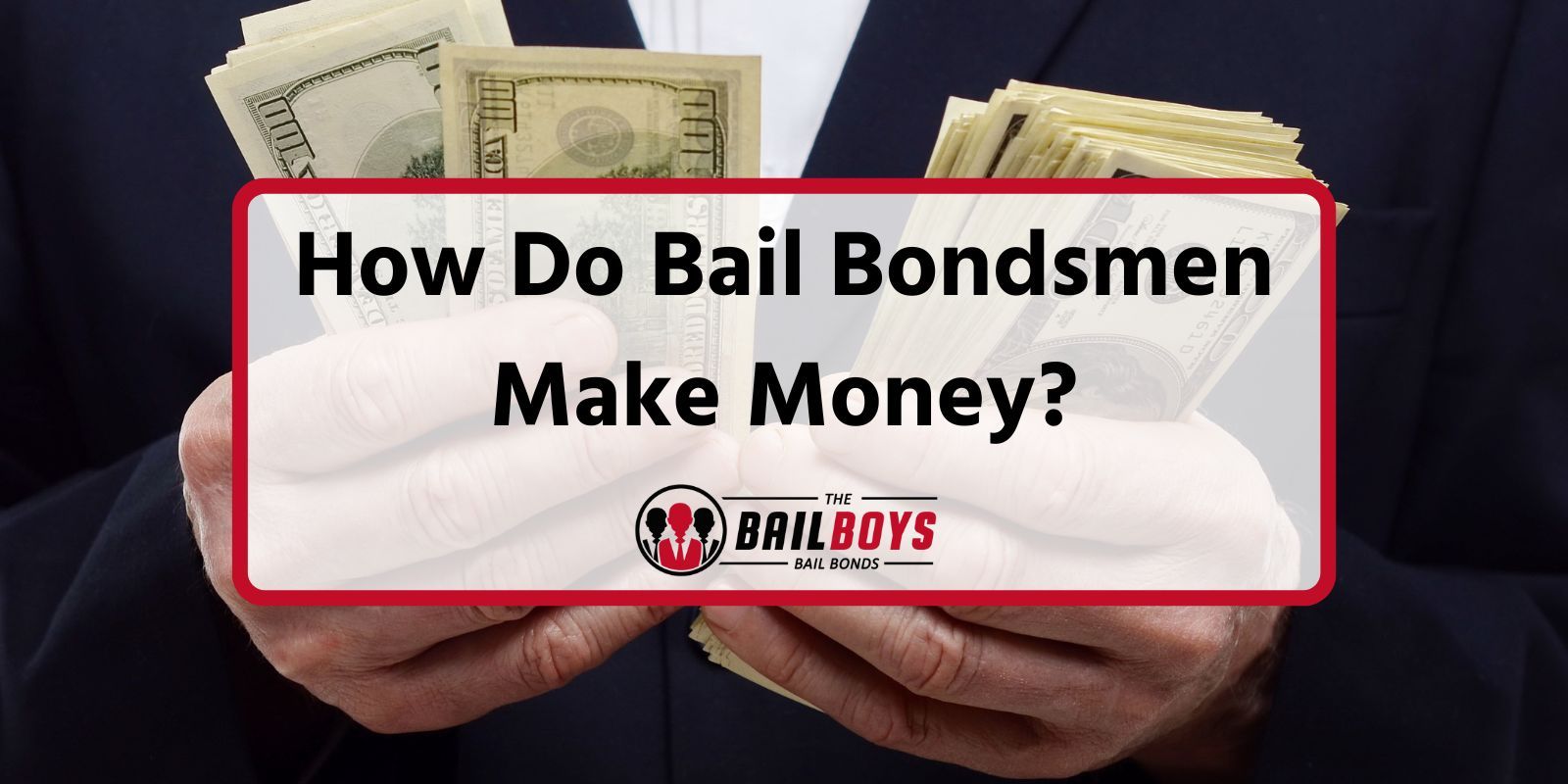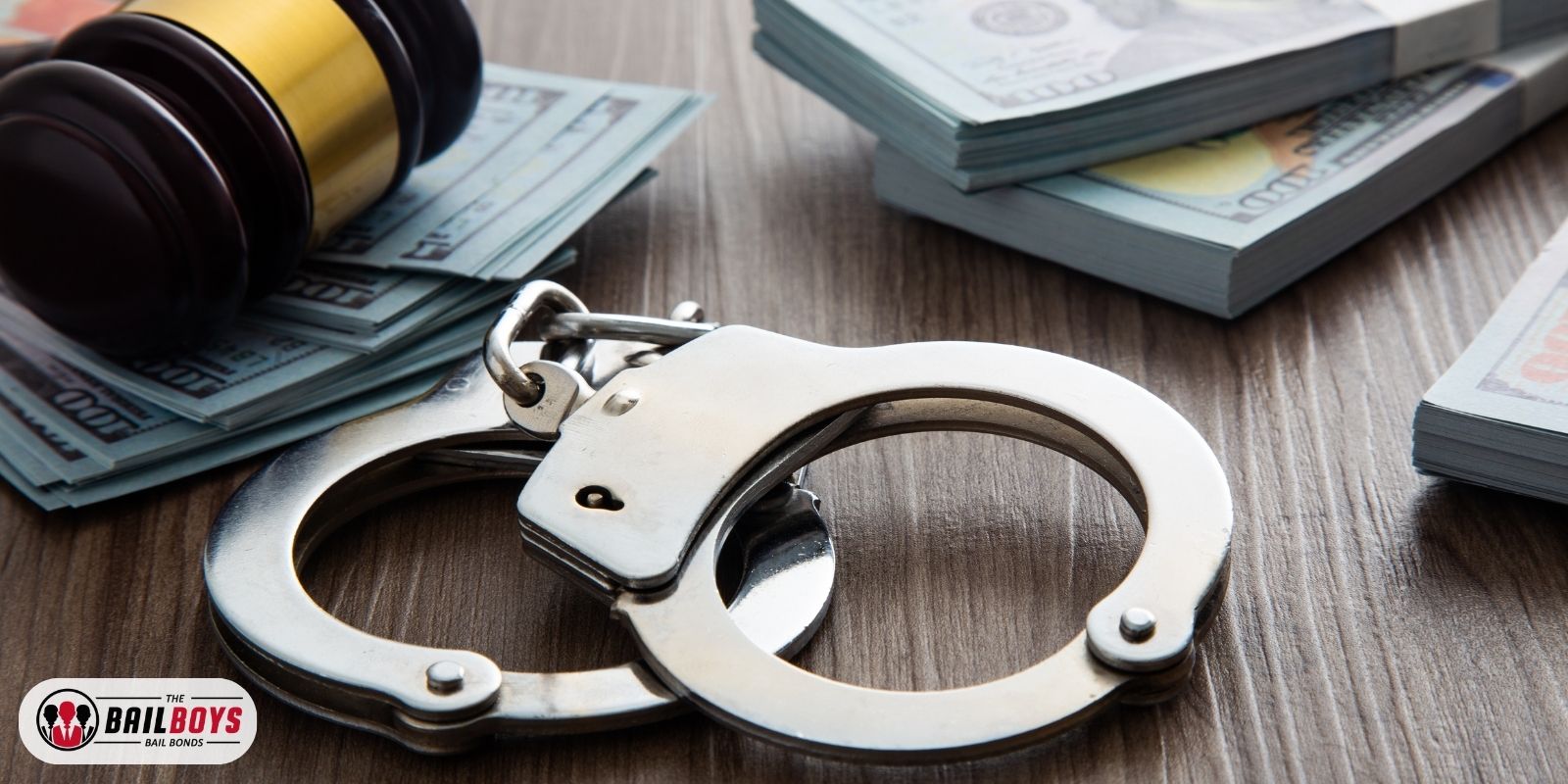
How Do Bail Bondsmen Make Money?
Bail bondsmen play a significant role in the criminal justice system by helping individuals secure their freedom from pretrial detention. However, the bail bond industry is a business, which means it must generate revenue and profits to stay afloat.
So, how do bail bondsmen make money?
Here, let’s explore the basics of bail bonds, how bail bondsmen make their money, risks and challenges in the bail bond industry, and the controversy surrounding the bail bond industry.
The Bail Process: A Brief Overview
Bail is the amount of money or property that you post to secure your release from pretrial detention. The purpose of bail is to ensure that the defendant appears in court on every court date for all scheduled court appearances, and to prevent unnecessary detention, as the law presumes you are innocent until proven guilty.
When you’re arrested, the police take you into custody and bring you before the judge who determines whether you’ll be granted bail. If so, the judge sets the appropriate bail amount considering various factors, such as:
Criminal History
If you’re a repeat offender or you have a history of violating bail conditions, the court may set a high bail amount.
Severity of Your Offense
The more severe the offense, the higher the bail amount. For example, you don’t expect a DUI (Driving Under the Influence) case to carry the same ball amount as a drug trafficking offense.
Flight Risks
The court usually sets a high bail amount if there’s a high chance that you’ll evade prosecution. Factors that contribute to your flight risks include having multiple passports and low community ties.
Community Ties
Having strong community ties makes you a low flight risk and therefore compels the court to set a low bail amount. Indicators of strong community ties include residence, family, employment, and membership in religious or social organizations.
Public Safety
If the court perceives you as a threat to the public, the victim, or the witnesses, they may set a high bail amount and impose harsh bail conditions like house confinements and electronic monitoring.
If you fail to appear in court while you’re on bail, the court may revoke your bail and issue an arrest warrant. This means you’ll lose the money or property you used to post your bail, and law enforcement will take you back into custody. Also, you may incur additional charges like bail jumping which will add to the severity of your sentence at the end of your trial.
The Basics of Bail Bonds
Bail can be extremely high and not everyone is financially capable of posting their full bail amounts. This is where the bail bond comes in. A bail bond is a type of surety bond that the bail agent (also known as bail bondsman) posts on your behalf, guaranteeing the court that you’ll appear on all your scheduled hearings.
Under the traditional cash bail system, you’re required to post your full bail amount in cash or cash equivalents. However, the bail bond requires you to pay the bail bond agent a percentage of the full bail amount known as a premium. The premium is a non-refundable fee, as it compensates the bail bonds agents for undertaking the responsibility and risks of posting bail and ensuring the defendant appears in court.
In most cases, you may need a cosigner during the bail bond process. A cosigner is an individual, usually your relative or friend, who will be financially responsible for paying the full bail amount if you skip bail. Bail bond companies may require the cosigner to provide their asset or property as collateral for your release.
How Bail Bondsmen Make Money
Premiums
The defendant or their cosigner is required to pay the bail bonds company a premium for their bond service. The premium ranges from 10% to 15% of the total bail amount. That is, if the court sets your bail at $100,000, you’ll pay the bail bondsman a premium of $10,000 to $15,000. The premium is the primary source of income for the bail bondsman.
Collateral
If you fail to appear in court, it could create financial losses for the bail bondsman as they may have to pay the court your full bail amount, if they don’t apprehend you. To mitigate this loss, the bail bondsman may require collateral. The collateral can be in the form of real estate, houses, jewelry, or any valuable item. Upon the revocation of your bail, the bail bondsman may sell the collateral to recover the losses and may realize some profits from the sale of the collateral.
Financing Arrangements
The bail bondsman may offer payment plans if you or the cosigner cannot pay the premium in full: you may be allowed to pay the premium within a specified period of time or in installments. These payment plans, however, come with interests or fees, which translates to profit for the bail bond agents.
Recovery and Bounty Hunting
When you skip court, the bail bondsman becomes responsible for apprehending you. Hence, they may employ the service of a bounty hunter to apprehend you. Unlike the police, the bounty hunter can cross jurisdictions to locate you and bring you back to custody.
Bounty hunters typically receive a percentage of the bail amount in compensation after a successful capture. Capturing you with the help of a bounty hunter will help the bail bondsman recover the bail money they have paid to the court on your behalf.
Risks and Challenges in the Bail Bonds Industry
Beyond the financial gains, the bail bond industry carries inherent risks and challenges, including the defendant’s potential to skip court, inability to recover the full bond amount, and legal and ethical concerns.
Defendant’s Potential to Skip Court
Skipping court is a serious offense as it indicates an attempt to evade prosecution, and an unwillingness to follow court order. When you skip bail, the bail bondsman pays the full bail amount, resulting in financial losses. This is why they conduct thorough background checks and risk assessments before working with you or your cosigner.
Potential Inability to Recover the Full Bond Amount
In the worst-case scenario, the bail agent may not recover the full bail amount if the bounty hunter cannot locate you. Imagine you flee prosecution, leaving a $5 million bond behind. How would the bail bond business cope after paying this amount? This is the type of financial crisis that can put the bail bondsman out of business.
Legal and Ethical Challenges
The movement for bail reforms at the federal and state levels poses legal challenges for the bail bond industry. The bail reform movement is compelling the judicial system to abolish cash bail and adopt ROR (Release On Recognizance) to eliminate the alleged discriminatory practices in the bail system.
Furthermore, some organizations and individuals have accused the bail bond industry of predatory lending practices. They argued that the bail bond company charges high fees and interest rates, leaving the defendant and their family financially stressed.
These challenges and accusations have also subjected the bail bond industry to heavy media and public scrutiny, as they’re viewed as discriminatory and predatory against the poor and people of color.
The U.S. bail bond system is under severe criticism for its perceived lack of fairness and equity, especially toward low-income individuals. Critics argue that the bail system is based on the defendant’s ability to pay, rather than the risk they pose to the public.
This means that a rich defendant, irrespective of the severity of their crime, can secure their release, while the poor defendant may risk spending weeks, months, or even years in jail, even if they committed a minor offense.
This creates more financial stress for the low-income defendant, puts them at risk of losing their job, and even makes it difficult for them to prepare their defense strategy, increasing their chance of being found guilty. Moreover, studies have shown that any period of pretrial detention increases the likelihood of a guilty plea by 23% and a prison sentence by 35%.
In response to the criticisms and public backlash against the cash bail system, some states have adopted bail reform. For example, California, New York, Nebraska, New Jersey, Indiana, and Arizona have adopted cash bail alternatives like pretrial programs and risk assessment strategies for certain crimes. Currently, Illinois is the first and only state that has completely eliminated the cash bail system.
Conclusion
Bail bondsmen make their money primarily from premiums, which is the percentage of your full bail amount. They may also make money from other sources such as financing arrangements, sales of collateral, and bounty hunting and recovery.
The bail bond industry is a business, that is, they’re motivated by profit.
However, they play a significant role in the justice system by helping the defendant secure their release from pretrial jail. If you need a bail bondsman service, you should do proper research and contact us for a free consultation.







